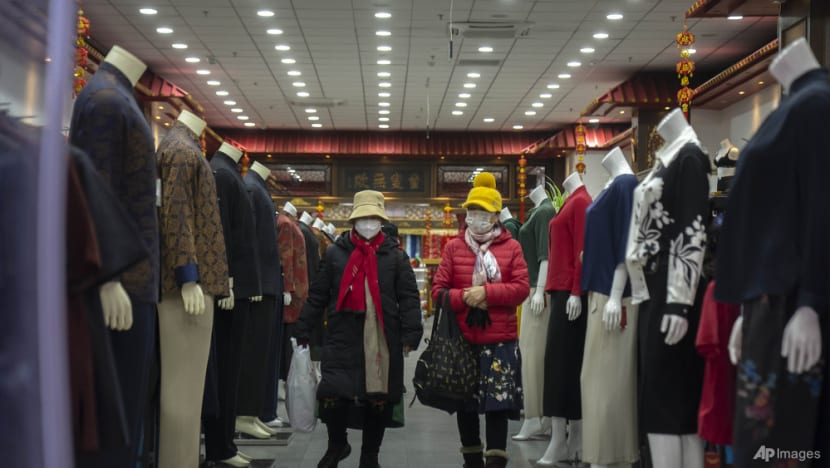Economic growth expected to take precedence at China’s annual legislative meeting
Since the lifting of its zero-COVID policy in December last year, economic activity has been set abuzz and local demand is expected to be a key driver of growth this year.

Women wearing face masks walk past mannequins at a clothing shop along a tourist shopping street in Beijing, Feb. 28, 2023. (AP /Mark Schiefelbein)
SHANGHAI: Economic growth is expected to be a top priority as China’s leaders gather at the “two sessions” annual parliamentary meetings.
Experts forecast growth to rebound to at least 5 per cent this year, with the Chinese government expected to set a higher official target to boost market confidence, as the country emerges from the COVID-19 pandemic.
"We think the central government is likely to set a reasonable growth target of between 5.5 per cent (and) 6 per cent," said Ms Mattie Bekink, China director of business networking forum Economist Intelligence Corporate Network.
"Given the low base of 2022, this is a reasonable range and something they are likely to achieve."
China’s gross domestic product (GDP) grew just 3 per cent in 2022, way below the official target of around 5.5 per cent, largely due to a drop in domestic consumption stemming from months of strict pandemic restrictions.
DOMESTIC DEMAND RETURNS
Since the lifting of its zero-COVID policy in December last year, economic activity has been set abuzz and local demand is expected to be a key driver of economic growth this year.
Many businesses have already reported a steady increase in patrons and revenue.
Movie theatres, for instance, have seen a robust rebound, as people flocked to the cinemas after a year of on-and-off lockdowns.
Box office sales set a record in January, as new blockbusters hit the screens during the Chinese New Year period.
Theatres sold 201 million tickets in total, earning more than 10 billion yuan (US1.45 billion), according to local Chinese media.
Cinemas said they have seen an increase in customers even during off-peak periods.
Economists expect China to set a robust growth target of between 5.5 and 6 per cent to boost market confidence when top leaders meet at the annual gathering of the National People’s Congress this weekend. Growth is expected to take precedence over other competing policy objectives, such as regulatory reforms and reducing carbon emissions. Low Minmin reports.
"Normally, the number of film-goers in the afternoon is not satisfactory – about 5 per cent. Now the number of people in the afternoon is about 15 per cent, which is our ideal number and it is slowly increasing," said Lu Ying, manager of UME Cinemas’ Shanghai Xintiandi branch.
The rapid comeback of the film industry, as well as other sectors, is raising expectations of a stellar economic recovery this year.
But despite the positive outlook, some business owners on the streets of Shanghai are still not seeing adequate footfall, and are choosing to remain cautious.
"Consumer spending is still not good. Unlike in the past, there is now a limit to sales," said Ms Xu Yuanyuan, a shopkeeper at Zhi Shu Cotton Hemp Shop.
"I can’t say that we can go back to (pre-pandemic) times. Because a lot of foreigners have left," said Mr Huang Sheng, the co-founder of Icy Gelato.
INCREASED EXPECTATIONS
Analysts expect the government to prioritise growth above all else, including over competing policy objectives such as regulatory reforms and reducing carbon emission.
"You are already seeing the government, for example, reverse its position on several areas of the economy that have been under regulatory scrutiny, like the platform economy," said Ms Bekink.
"(This means) China's tech companies and some of the measures, policy priorities that might have been more economically disruptive, like common prosperity or even decarbonisation, seem to be taking a backseat in 2023."
While Chinese President Xi Jinping and his policy makers – who will undergo a reshuffle during the meetings starting this weekend – are expected to go all out to drive growth this year, external headwinds remain strong.
The risk of a global recession could snag Chinese export growth, and an escalation in Russia’s invasion of Ukraine could lead to potential sanctions against Beijing and the further disruption of supply chains.
The big question is how big of a fiscal deficit the government will run to boost growth, said analysts.
Government coffers are already shrinking from overspending on its zero-COVID policy, while a property crisis has also cut off a big chunk of land sales revenue.
Experts said China will likely introduce moderately cautious monetary and fiscal policies this year.
"The final thing that we might see from a policy perspective would be calls for increased or more efficient public spending, (amid) growing concerns about sustainable fiscal policy," Ms Bekink said.
Oxford Economics’ senior economist Louise Loo said: "With reopening tailwinds, there is an acknowledgement that maybe there is less of a need to kind of implement a broad base of a bigger scale fiscal stimulus. So the government is going to try to let the economy do its work."
With zero-COVID controls now history, all eyes are on how well China’s economy will perform.
Injecting confidence into the economy will be the first big test for China’s potential new premier Li Qiang, as he takes over the reins from outgoing premier Li Keqiang.
















